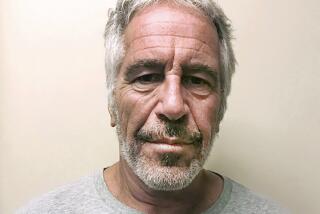Merrill Settles Inquiry Into Dealings With Enron
- Share via
NEW YORK — Merrill Lynch & Co. said Thursday that it agreed to pay $80 million to settle a federal investigation of its transactions with Enron Corp.
The payment, the first by a securities firm to settle Enron- related probes, would end the Securities and Exchange Commission’s investigation of Merrill’s $7-million investment in three barges moored off Nigeria.
The settlement also would end the SEC’s inquiry into several energy trades Merrill made with Enron in 1999.
Merrill said it reached the agreement with the SEC’s staff and that the firm would not admit or deny wrongdoing.
Enron has become a symbol of accounting abuses that many analysts say were widespread in the late 1990s as companies sought to boost their reported earnings and their stock prices.
“The SEC is saying Merrill was a willing participant in Enron’s scheme to mislead” investors, said Chris Bebel, a former SEC attorney now with law firm Shepherd Smith & Bebel in Houston. “This sets the bar quite high for the other firms that were more involved with Enron.”
Merrill, J.P. Morgan Chase & Co. and Citigroup Inc. have been the focus of investigations by Congress and the SEC over loans and other financing they arranged for Enron that may have helped the company hide debt and inflate earnings, leading to the firm’s collapse in 2001.
In the case of the Nigerian barges, former Enron Chief Financial Officer Andrew S. Fastow allegedly pressured Merrill to buy the barges in 1999 so Enron could record $12 million in profit. Enron financed the rest of the $28-million purchase with a loan to Merrill, according to a criminal suit against Fastow.
At the time of the deal, a Merrill investment banker, Jim Brown, expressed concern that the transaction might be seen as helping Enron manipulate earnings. Brown wrote that the bank might suffer “reputational risk i.e. aid/abet Enron income [statement] manipulation,” according to notes released in July at Senate hearings.
“The SEC was arguing that it was a sham transaction,” Bebel said. “Merrill did this in order to endear itself to Enron executives so it might increase its prospects of investment banking business in the future.”
A Merrill spokesman said the firm agreed to settle because “we’re putting this behind us.” Under the settlement terms, Merrill would pay $80 million in disgorgement, penalties and interest and take a fourth-quarter 2002 charge to account for it.
More to Read
Inside the business of entertainment
The Wide Shot brings you news, analysis and insights on everything from streaming wars to production — and what it all means for the future.
You may occasionally receive promotional content from the Los Angeles Times.










